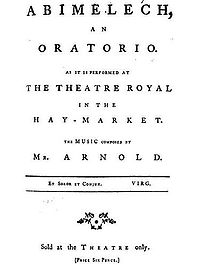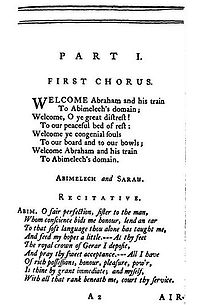
Abimelech (oratorio)
Encyclopedia

Oratorio
An oratorio is a large musical composition including an orchestra, a choir, and soloists. Like an opera, an oratorio includes the use of a choir, soloists, an ensemble, various distinguishable characters, and arias...
in three acts written by Christopher Smart
Christopher Smart
Christopher Smart , also known as "Kit Smart", "Kitty Smart", and "Jack Smart", was an English poet. He was a major contributor to two popular magazines and a friend to influential cultural icons like Samuel Johnson and Henry Fielding. Smart, a high church Anglican, was widely known throughout...
and put to music by Samuel Arnold
Samuel Arnold (composer)
Samuel Arnold was an English composer and organist.Arnold was born in London , and began writing music for the theatre in about 1764. A few years later he became director of music at the Marylebone Gardens, for which much of his popular music was written...
. It was first performed in Haymarket Theatre
Haymarket Theatre
The Theatre Royal Haymarket is a West End theatre in the Haymarket in the City of Westminster which dates back to 1720, making it the third-oldest London playhouse still in use...
in 1768. A heavily revised version of the oratorio ran at the Covent Garden
Royal Opera House
The Royal Opera House is an opera house and major performing arts venue in Covent Garden, central London. The large building is often referred to as simply "Covent Garden", after a previous use of the site of the opera house's original construction in 1732. It is the home of The Royal Opera, The...
in 1772. Abimelech was the second of two oratorio librettos written by Smart, the first being Hannah
Hannah (oratorio)
Hannah is an oratorio in three acts by Christopher Smart with a score composed by John Worgan. It was first performed in Haymarket theater 3 April 1764. It was supposed to have a second performance, but that performance was postponed and eventually cancelled over a lack of singers...
written in 1764. Just like Hannah, Abimelech ran for only one night, each time. It was to be Smart's last work dedicated to an adult audience.
Abimelech retells the biblical story of Abraham
Abraham
Abraham , whose birth name was Abram, is the eponym of the Abrahamic religions, among which are Judaism, Christianity and Islam...
and Sarah
Sarah
Sarah or Sara was the wife of Abraham and the mother of Isaac as described in the Hebrew Bible and the Quran. Her name was originally Sarai...
when they met the King of Gerar, Abimelech
Abimelech
Abimelech was a common name of the Philistine kings.Abimelech was most prominently the name of a king of Gerar who is mentioned in two of the three wife-sister narratives in Genesis...
, and he tries to take Sarah as his wife. After God intervenes in a dream, Sarah, who was previously barren, is restored to Abraham and made fertile. The oratorio emphasizes the sexual jealousy and the sexual fidelity of spouses.
Background
Years before, Smart wrote a libretto for an oratorio called Hannah. Like Hannah, Smart most likely wrote the work out of a need to earn money. However, his previous oratorio only lasted a few nights, and Smart hoped that his second could succeed where the other failed. This would be the last work in Smart's final years that was written completely for adults.An advertisement for Abimelech ran in the "Musical Intelligencer" section, of the Public Advertiser, on 16 March which said:
"YOUNG Abimilech will be exercised on Foote's Theatrical Heath on Wednesday next, when he will run three Trial-heats. He was bred by the celebrated Kit Crazy, who rode flying Pegasus the great Match round the Hop-Garden and who is universally allowed to be a SMART Fellow, and a tolerable Psalmodist. Abimilech is half Brothers to Saul, which beat Sampson on Friday 19th of February, tho' the Odds in the upper half of the Scaffold were Three and a Half to One. Abimilech has been a long while in Training under little Arnold, a Man of sound-Knowledge, who tho' of a diminutive Size, hath such amazing Strength in his Composition, that, when he gets with his Airs, he will seize on any Man alive, and take him by the Ears."
Abimelech was performed once at the Theatre Royal on 18 March 1768 and once, after Smart's death, at Covent Garden on 25 March 1772. There are no surviving scores for Abimelech, but the libretto was sold during its run at the Theatre Royal, Haymarket, in 1768 and the run of the revised version of the oratorio at the Covent-Garden in 1772. These works were published anonymously but Charles Burney
Charles Burney
Charles Burney FRS was an English music historian and father of authors Frances Burney and Sarah Burney.-Life and career:...
, Smart's friend, attributes the libretto to Smart and pasticcios from Handel
Pastiche
A pastiche is a literary or other artistic genre or technique that is a "hodge-podge" or imitation. The word is also a linguistic term used to describe an early stage in the development of a pidgin language.-Hodge-podge:...
in his General History of Music. The "pasticcios" were musical selections from Handel used by the composer Samuel Arnold.
Abimelech

There is an emphasis on the sexual jealousy of Abraham over Abimelech's treatment of Sarah. This was partly done for "theatrical effect". However, there is also an emphasis on the impious actions of the Gentiles of Gerar and of their inability to love properly, especially when Hagar sings:
- Lo, her ears
- Have suffer'd profanation from the lips
- Of an enamour'd Gentile - Couldst think,
- That men remoter from the truth of God,
- And more of brutal nature, should controul
- Their appetite from such a form as Sarah's?
- (Abimelech 94-99)
As the oratorio continues, there is emphasis that only those who follow the true God are capable of understanding the proper ways to act.
Roles
- Abraham
- King Abimelech
- Phichol Chief Captain
- Sarah
- Hagar
- Queen of Gerar
- Officers, Soldiers, and other Attendants
Critical response
After the second version of Abimelech ran at the Covent-Garden, a reviewer in The Theatrical Review claimed that the oratorio was changed "greatly for the better". Another review in The Theatrical Review claimed that Abimelech was "a very pleasing Oratorio, though there is great sameness in the songs, but the chorusses are masterly and grand". Later, Thomas BusbyThomas Busby (composer)
Thomas Busby was an English musical composer. He was the son of a coach-painter. He was born at Westminster in December 1755.-Early life:...
claimed that "the applause obtained by this his second oratorical production [Abimelech], established the reputation of its composer [Arnold]".
The Monthly Review and Critical Review ignored Abimelech, which prompted Arthur Sherbo, a later critic, to claim that they "were kind to Smart and Arnold" for their silence. Another later critic, Moira Dearnley, said, "devotion and human relationships is uneasy, not to say ridiculous." Another critic, Frances Anderson, puts it bluntly: "it was not reprinted and seemed of mediocre quality". However, this turned out to be untrue.

